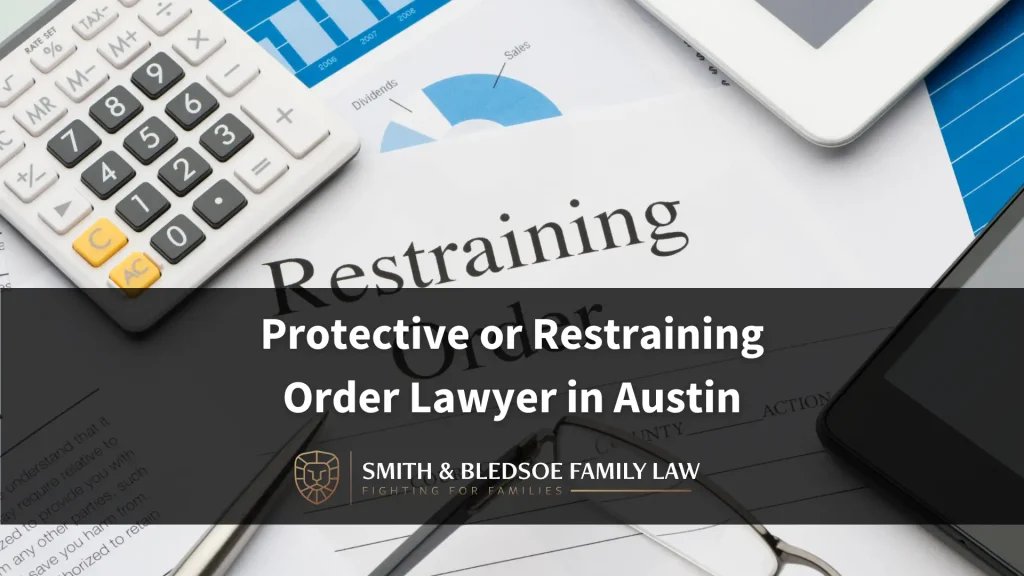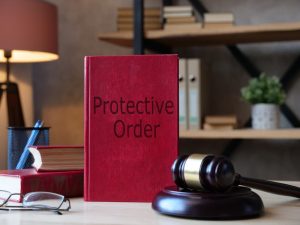
If you are a victim of domestic violence committed by your spouse or someone else in your household, you should report what happened to the police first. Then contact Smith & Bledsoe Family Law to learn about your legal rights and options. Furthermore, our protective or restraining order lawyers in Austin can help you file for a protective order to prevent you from further harm.
At Smith & Bledsoe Family Law, we understand the urgency of your situation. Whether you, your child, or another person in your family is in danger, you can count on our legal team to take prompt action. We will efficiently and diligently seek an emergency protective order to keep you safe until the court hearing.
Call Smith & Bledsoe Family Law at (512) 277-3166 for a free case evaluation with an experienced family law attorney in Austin.
Types of Protective Orders in Texas
You have two options to choose from when your spouse abuses you or your child:
- Restraining order – A restraining order might be necessary during a contentious divorce. It prohibits someone from engaging in specific activities or behaviors related to the pending case. For example, a person might need a restraining order to prevent their spouse from harassing them during divorce proceedings.
- Protective order – A judge can issue a protective order whether there is an ongoing court case. It protects victims from further domestic violence, abuse, sexual assault, or threats of violence. It can also offer various forms of relief under specific circumstances, such as custody of a child if the other parent abuses them.
Certain individuals are eligible to file for a protective order, such as:
- Members living in the same home
- Blood relatives
- A non-related or related child residing in the household
You must have evidence of violence or an imminent threat of violence against you to petition the court for a protective order. If the court approves your request, the order will restrict your spouse from contacting you in any way.
In Texas, you can file for three types of protective orders:
- Temporary ex-parte order – A temporary ex-parte order grants the victim immediate protection from additional violence by their abuser. The judge will issue the order if they discover a risk of family violence. However, the order is only valid for up to 20 days. You can request an extension, or the court might extend the protective period for another 20 days at its discretion.
- Magistrate’s order for emergency protection – The magistrate might issue an order for emergency protection after an arrest involving family violence, sexual assault, aggravated sexual assault, indecent assault, family violence, trafficking, or stalking. The court order lasts between 31 and 61 days. It can remain in effect between 61 and 91 days if the assault involves exhibiting or using a deadly weapon.
- Permanent protective order – A final protective order isn’t necessarily permanent because it has an expiration date. The judge will determine whether to grant the order, which can remain in effect for up to two years. However, they might extend the period for longer under specific circumstances.
How to Get a Protective Order in Texas
You must follow a particular legal procedure to request a protective order if you or your child is a domestic abuse or family violence victim. Hiring a skilled protective or restraining order lawyer in Austin from Smith & Bledsoe Family Law can benefit you. Specifically, we will guide you during each step and help with every aspect of the process. Here are the steps you must follow.
Complete and File the Application
First, you must complete an application describing the acts of family violence and who committed them. The documents get filed in the county where you or the respondent resides or where the incident occurred. Furthermore, if you have a pending divorce case, you must file with the same court and mention the other case.
A separate application is necessary to request a temporary ex-parte order. In the request, you must include:
- A detailed description of the circumstances of the family violence and the necessity for an immediate protective order; and
- Your signature under oath to confirm the truthful nature of the details in the application.
Service and Response
The court clerk will issue a notice of an application for a protective order to your spouse. Typically, a process server or law enforcement official hand-delivers the papers. Your spouse can file an answer any time before the scheduled hearing. However, responding isn’t a requirement.
Ex-Parte Order
If the judge grants an ex-parte order after reviewing the application, they can impose specific conditions. Those conditions can include:
- Prohibiting your spouse from contacting or harming you
- Listing the places your spouse must avoid going to
- Granting sole possession of the residence or temporary custody of the children
Court Hearing
During the hearing, you must prove the allegations you’re claiming. That means showing evidence of family violence or domestic abuse against you or your child. Your spouse can provide testimony and evidence to defend themselves and argue against a protective order.
Judge’s Ruling
The judge will hear your and your spouse’s sides and determine whether to grant your request. If they believe a protective order is warranted, they will issue a final protective order. The protection can last two years or longer depending on certain factors, including whether your spouse commits a felony offense of family violence.
The final order can include terms such as:
- Granting you possession of your shared residence, requiring your spouse to move out
- Dividing personal property between you
- Prohibiting your spouse from contacting you or possessing firearms
- Awarding attorneys’ fees and costs
- Ordering your spouse to complete a family violence prevention program
- Ordering your spouse to pay child support and awarding you custody of your children
Protective or Restraining Order FAQs
In Texas, protective orders serve as vital legal tools for individuals seeking safety from threats or harm. Whether you are curious about the enforcement of these orders or the consequences of a violation, here’s what you need to know.
How Long Does a Protective Order Last in Texas?
In Texas, the expiration date of a protective order largely depends on its type. Here’s a breakdown of the different types of protective orders and how long they remain in effect:
- Emergency Protective Orders: Judges issue emergency protective orders or EPOs after police officers respond to domestic violence incidents. An EPO can last anywhere from 31 to 61 days. It offers immediate protection but is not meant to provide a long-term solution.
- Temporary (Ex Parte) Protective Orders: A judge can grant a temporary or “ex parte” order without having the alleged abuser present in court. These orders might be appropriate when there’s an immediate threat or danger. An ex parte order usually lasts up to 20 days, but the court can extend it in additional 20-day increments as necessary.
- Final Protective Orders: Once both parties have opportunities to present their cases in a court hearing, a judge might issue a final protective order. This type of order usually lasts up to two years, but judges can extend it in certain circumstances. A final protective order might last longer than two years if there is a proven history of family violence or serious acts like sexual assault.
What Happens If You Violate a Restraining or Protective Order?
In Texas, restraining or protective orders are examples of court orders. Violating a court order is a criminal offense that can have severe consequences.
If someone is in violation of a protective order in Texas, they can face criminal charges. The exact charge will depend on the circumstances surrounding the violation, but it’s typically a class A misdemeanor. However, if the violator has violated a protective order in the past, or if the violation involved stalking or resulted in physical harm, it can escalate to a third-degree felony.
One of the primary consequences of such a violation is jail time. For a class A misdemeanor, an offender can face up to one year in jail and a fine of up to $4,000. If the violation is a third-degree felony, the offender could face two to ten years in prison and a possible fine of up to $10,000.
What Happens If a Protection Order in Texas Is Not Served?
If no process server or law enforcement officer serves a protection order, it’s not enforceable. The individual named in the order might not even know it exists.
The effectiveness of a protection order largely depends on successfully serving the relevant papers to the respondent. The order officially notifies the individual about the legal restrictions against them and the consequences they will face if they violate those restrictions.
When service of a protection order does not occur, the individual it protects should promptly communicate with law enforcement or their attorney. Swift corrective action is essential to ensure their safety, as any delay could provide opportunities for further mistreatment.
Keep Yourself and Your Family Safe with Help from Smith & Bledsoe Family Law
Smith & Bledsoe Family Law works hard to protect people going through ugly divorce battles. We know your safety and the safety of your kids are crucial. We will provide the representation and support you need to get your family out of this traumatic situation and on a better path.
Our team has more than 15 years of combined legal experience helping people get out of difficult domestic situations. If you have become the victim of domestic violence and want to pursue a protective order, call us at (512) 277-3166 for a free case evaluation with a compassionate protective or restraining order lawyer in Austin.
Related Posts:
